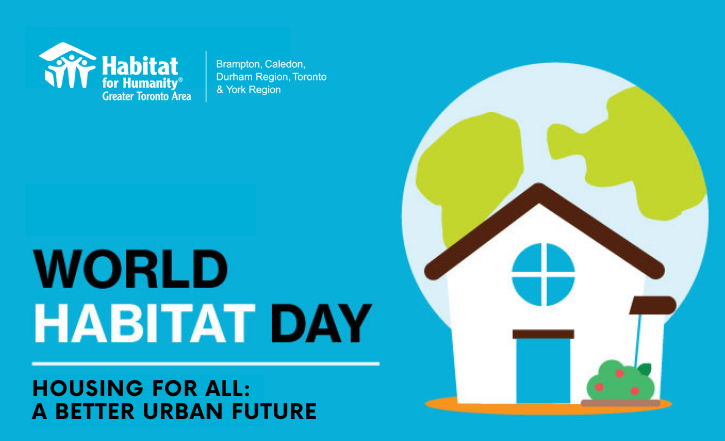Housing as more than shelter: Reflecting on World Habitat Day 2020

A World Habitat Day 2020 reflection by Our CEO, Ene Underwood
Above is a discussion on ULI Toronto’s Electric Cities podcast with host Jeremy Warson and our CEO, Ene Underwood, about how it is now more important than ever for governments, private sector, and not-for-profits to collaborate and create housing opportunities for families in need of a decent place to live, and better access to homeownership and the prospect for a healthier quality of life.
“Stay home”. “Shelter-in-place”.
How many times have we said or heard statements like these in the last seven months?
I’ve lost count of the number of times I have talked about how grateful I am to have a home with a quiet place for me to work, reliable WiFi, air conditioning, and some natural light.
Home has Never Been More Important
Yet, for thousands of citizens across the GTA and millions around the world, “home” – if it even exists – is anything but safe, let alone a place conducive to work, homeschool children or spend quality time with family.
Thirty-five years ago, the United Nations declared the first Monday of every October World Habitat Day, and today in 2020, it has never felt more important.
With the global COVID-19 pandemic and recognition of ongoing systemic racism, 2020 reminds us that we have a lot more work to do to make adequate shelter a basic human right.
In thousands of lower-income households across the GTA, people don’t have the option of working from home. For them, work is serving customers from behind retail counters, cleaning our long-term care homes, and delivering food and parcels to front doors.
For many families, simply leaving home creates risk exposure when they face the choice between getting on a crowded elevator or walking down 15 flights of stairs with two young kids versus being late for a job they desperately need to keep.
Add to the mix having a family member who tests positive for COVID-19 and home becomes even more of a risk. It is impossible to self-isolate in a two-bedroom apartment that is home to a family of five, or in a one-bedroom basement apartment that you share with your aging mother.
Not All Homes are Equal
A July 2020 study published in the Globe & Mail found that greater than 50% of COVID-19 cases are from households earning $50,000 or less. There is a racial component to COVID-19 given that 69% of people in Toronto’s lowest-income neighbourhoods are racialized versus 73% of people in Toronto’s highest income neighbourhoods being white. Data reported by the City of Toronto found that reported that Black citizens and people of colour make up 83% or COVID-19 cases in the city.
There are solutions to the housing realities faced by our Region’s most vulnerable. We need to support the efforts of all levels of government to invest in and accelerate the creation of more affordable housing. We need to support the Ontario government’s efforts to reduce red tape that creates delays in delivering housing of all types. We need to ask the kind of bold questions posed by Dr. Kofi Hope in his recent Toronto Star editorial and push for mixed-income development not just in neighbourhoods undergoing redevelopment, but also in established neighbourhoods.
Beyond this, we need to think long-term. Our governments are rushing to implement solutions with an emphasis on affordable rental and transitional housing for people who are homeless. This is long overdue, but our energies and investments shouldn’t stop there. Habitat for Humanity has long urged balanced investment across the full housing spectrum – from homelessness through to affordable homeownership. Understandably, the latter sounds like a luxury at this critical moment in time. Isn’t the point just to ensure everyone has an adequate roof over their heads? Isn’t rental good enough – especially given the current real estate market? Not if we want to avoid being right back where we started after the money runs out.
Home as a Pathway to Change and Opportunity
Habitat for Humanity has spent the last 45 years globally and 30 years locally, building decent homes for families and building a pathway to opportunity for succeeding generations. Making sure working, lower-income households have the opportunity to build financial independence through homeownership is the best way for families to build wealth and independence.
This is not unique to Habitat for Humanity. It has been the most common pathway for families to build wealth and independence throughout Canada’s history. It has kick-started careers, new businesses, children’s education, and a source of funds to help the next generation with their homeownership down payment. It is a formula that enables people to move from being the ones we talk about needing affordable housing to be the ones in a position to help others.
World Habitat Day 2020 finds us as citizens more in tune with the housing challenges in our region than ever before. Let’s rise to the challenge. Let’s champion broad-based investment across the full housing spectrum. Let’s support zoning and housing policy changes that open doors for more affordable housing in all neighbourhoods. Let’s donate to housing causes. Let’s be open to new models like rent-to-own, equity co-ops, co-ownership, and other creative ideas that promise sustainable housing solutions for generations to come.
This World Habitat Day, let’s recommit ourselves to a vision of the GTA that ensures adequate housing and opportunities to prosper for all citizens of today and tomorrow.